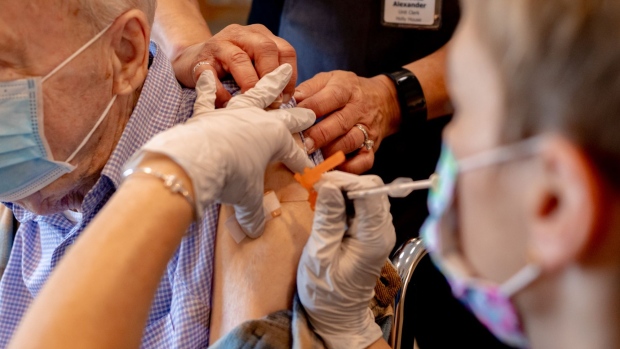Sep 23, 2021
CDC Weighs Pfizer Boosters After FDA Approval for Some Americans
, Bloomberg News

(Bloomberg) -- The Centers for Disease Control and Prevention director spoke to a panel of outside experts advising the agency on whether to recommend booster shots and if so, for whom, telling them that while the data supporting a booster shot isn’t “perfect,” they do offer guidance to help make a decision on a third dose.
“These data are not perfect but collectively they form a picture for us and they are what we have in this moment to make a decision about the next stage in this pandemic,” Rochelle Walensky told the panel as the meeting began, thanking them “for leaning into the complexity trying to fit the pieces together to come to the best conclusion.”
The CDC’s Advisory Committee on Immunization Practices is weighing whether to back a booster shot for the Pfizer Inc.-BioNTech SE Covid-19 vaccine ahead of a vote Thursday on the issue. On Wednesday, the Food and Drug Administration issued an emergency authorization for people 65 and older, as well as for people whose jobs put them at risk, such as health care workers, who got the Pfizer-BioNTech shot to receive boosters.
The discussion comes at a crucial time as the U.S. fights a surge of infections driven by the highly contagious delta variant. While the most seriously ill have been primarily the unvaccinated, breakthrough infections among the vaccinated have fueled concerns that the shots’ efficacy may wane over time.
The drugmakers had sought a broader clearance from the FDA and CDC for third doses for anyone 16 and older, a strategy that the Biden administration had also advocated. However the FDA’s decision to focus on high risk populations is reasonable, according to Jesse Goodman, a professor of medicine at Georgetown University and a former FDA chief scientist, especially given the limited clinical-trial data and continued uncertainty as to whether protection against severe infection is beginning to wane, Jesse Goodman, a professor of medicine at Georgetown University and a former FDA chief scientist.
“This allows time to get more data both on what is going on with breakthrough infections as well as on the safety and likely effectiveness of booster doses before extending their use to others,” he said.
Moderna Inc. has also applied for emergency authorization of a booster, and the agency is waiting for more data to support an additional dose from Johnson & Johnson.
The ACIP meeting began on Wednesday, discussing whether health authorities should focus on maximizing vaccinations or on improving protections for those who have gotten their shots. Grace Lee, the committee chair, said that while “I anticipate boosters will be inevitable,” persuading unvaccinated people to get shots should be the biggest priority.
Unauthorized Doses
Booster shots have already begun in some communities. More than two million Americans have received an additional vaccine dose since Aug. 13 when regulators authorized them for the immunocompromised, according to CDC data. It’s unclear how many of those doses went to people with weak immune systems as opposed to people who just wanted another shot.
If the CDC’s recommendation differs from the FDA’s, it’s likely that the unauthorized boosters will continue to be administered.
The debate over boosters has been heated in recent weeks, triggered by The White House’s announcement in August to offer boosters to almost all vaccinated adults starting Sept. 20. The plan raised concerns among health experts that the administration was racing ahead of the science and regulatory oversight.
While recent data from Israel supports the need for a third dose, some scientists and even two top FDA officials have questioned evidence for booster shots. Covid-19 vaccines work well and governments would be better served to focus on immunizing the unvaccinated, according to review published last week in The Lancet authored by an all-star panel of scientists from around the world.
©2021 Bloomberg L.P.